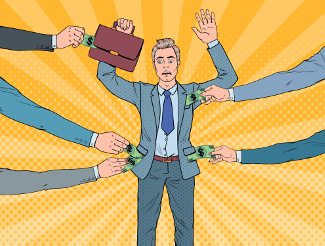With the Democratic takeover of Congress calls have come for new taxes on income and wealth. From calls to raise the highest tax bracket to 70% on the ultra-rich to proposals for an annual wealth tax on the wealthy, ideas abound for ways to soak the rich and get more money for various government programs and projects.
On the one hand, it isn’t surprising that the rich are coming in for such abuse. Envy of the ultra-rich has always existed, and with both actual and perceived income inequality growing in the United States, more and more households are struggling to make ends meet. Given how the big banks were bailed out 2008, many people in their minds think it’s only fair that, if they’re having to pay taxes that deduct from their income and detract from their ability to accumulate wealth, so should the rich.
On the other hand, what most people don’t realize is that expanding taxation on the rich won’t bring in appreciable amounts of tax revenue and will eventually result in higher taxes being placed on the not-so-rich. The idea that grandiose infrastructure programs can be funded through additional revenue, or that fundamentally insolvent programs such as Social Security can be saved through additional taxation, are pipe dreams.
The Government Has a Spending Problem, Not a Revenue Problem
The primary problem with any government program is that the government can’t go out of business. Once a government program is established it crowds out private sector alternatives, creating a monopoly that citizens can’t avoid. And because the government can’t go out of business and has no way of calculating profits and losses, it has no incentive to rein in its spending.
If a program “doesn’t have enough money” then politicians just raise taxes or increase borrowing. And the worse a program fails the more money is thrown at it in the hopes of it eventually becoming successful. That never happens, though, so waste and fraud continue to occur. They are almost features of the system, not bugs. Success is determined not by how many citizens are served, but by how much money is spent. That’s a recipe for disaster.
Just look at Social Security, which was poorly designed from the outset and which is destined to fail to meet its obligations to retirees within 15 years. Or look at government-run pension plans around the country, which are horribly underfunded and show no signs of being able to dig out of the holes they’ve gotten themselves into.
Soaking the Rich Will Get Other Taxpayers Wet
If you tax anything, you will get less of it. Tax the ultra-rich and you’ll have fewer ultra-rich taxpayers. Tax wealth and you’ll have less wealth. The ultra-rich will always be able to minimize their tax burdens, which will frustrate the government’s attempts at raising additional revenue. They’ll reduce their income subject to taxation or move their wealth offshore to other jurisdictions with lighter tax burdens.
If the government then expects to get X amount of money from new taxes on the rich it will fail to hit those numbers. That means that the next-lower tax bracket will see its taxes raised, or the merely somewhat well-to-do will see a wealth tax introduced.
Those people too will try to move their assets around and minimize their tax burdens, continuing to stymie the government’s attempts to raise revenue. That cycle will continue until every tax bracket is finally raised and every taxpayer feels the burden of higher taxation. It’s easy to support higher taxes when you don’t think you’re going to have to pay them, but eventually you’re going to feel their effect.
Prepare for the Future
With the likelihood of government spending decreasing already slim and becoming slimmer every day, the possibility of increasing taxation grows all the time. No one will be immune once the government comes knocking on doors seeking more revenue. And with so much financial business being done electronically, in many cases the government is just a mouse click away from being able to seize the assets in your bank or brokerage account.
That’s why many investors decide to invest in tangible assets that are more resistant to government depredation, including gold. By investing in gold you’ll have a tangible asset that is much more difficult to seize. If they government is coming after your money it will come for your bank, not your gold IRA custodian.
With gold you have not only a hedge against inflation and financial turmoil, you also have a hedge against rising taxation and asset forfeiture. While you can take distributions from your gold IRA in cash, you can also choose in-kind distributions. The government won’t be coming door-to-door to seize gold coins, it’s going to be aiming for bank accounts instead. Have you taken the right steps to prepare yourself?
This article was originally posted on Goldco.




